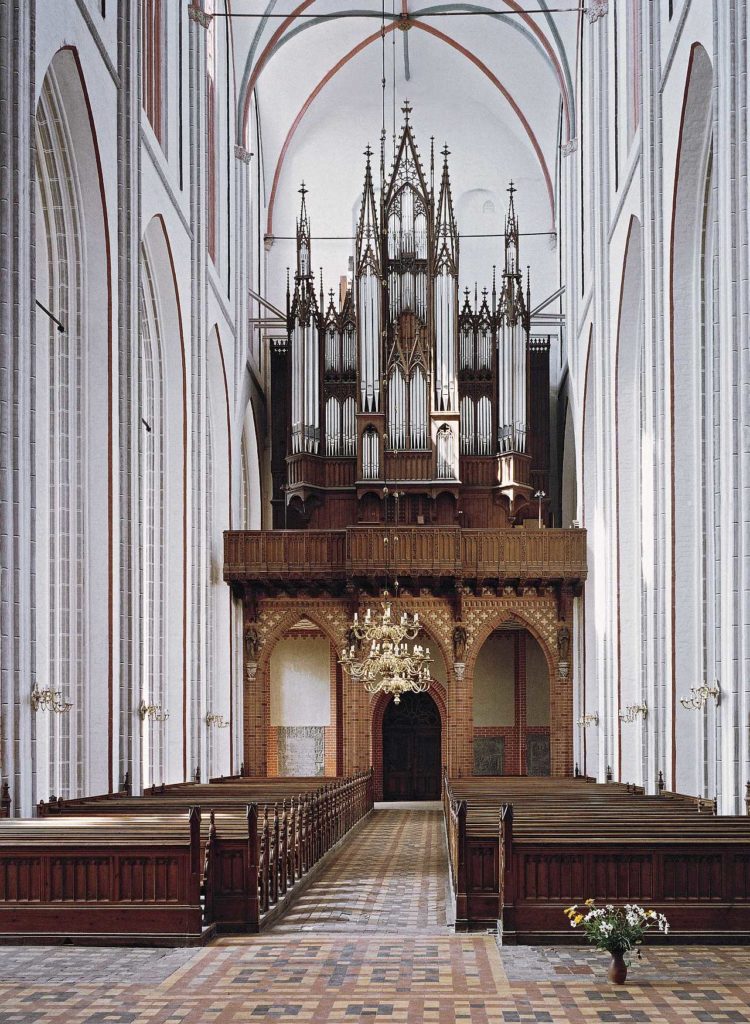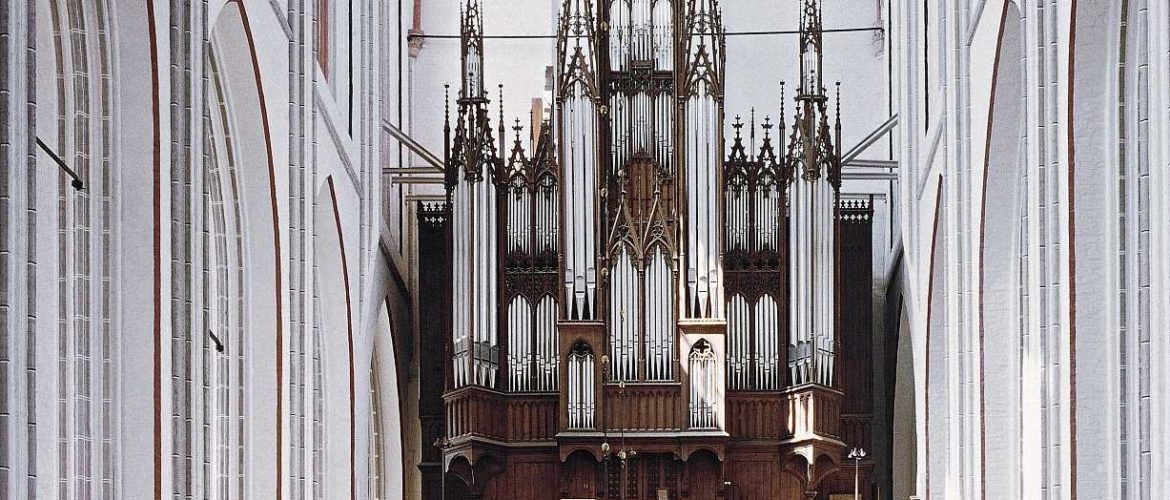Schwerin,
Dom
(Germany)
Dom
(Germany)
Restoration of the Lagegast organ from 1868-1871, Alexander Schuke Orgelbau GmbH, 1982-1988
The largest organ by Friedrich Ladegast from Weißenfels was built from 1868 to 1871 in Schwerin Cathedral and restored by Alexander Schuke until 1988.
Like the mechanical baroque organs before it, it has mechanical slider drawers, but also a mechanical cone drawer for the large pedal registers.
With the help of a barker machine, all manuals can be coupled from the lowest keyboard and are therefore still easy to play.
The pneumatic stop action made early forms of a crescendo roll and fixed combinations (“forte” and “piano”) possible.
The organ has 84 sounding stops on four manuals and pedal.

Stop list
- Principal 16′
- Bordun 32′
- Bordun 16′
- Principal 8′
- Doppelgedackt 8′
- Flaute major 8′
- Gemshorn 8′
- Gambe 8′
- Rohrquinte 5 1/3′
- Oktave 4′
- Rohrflöte 4′
- Spitzflöte 4′
- Terzflöte 3 1/5′
- Quinte 2 2/3′
- Oktave 2′
- Cornett IV
- Cornett I-II
- Mixtur IV
- Cymbel II-III
- Trombone 16′
- Trompete 8′
- Principal 16′
- Quintadena 16′
- Principal 8′
- Bordunalflöte 8′
- Rohrflöte 8′
- Quintatön 8′
- Fugara 8′
- Piffaro 8′
- Oktave 4′
- Flautino 4′
- Flöte 4′
- Quinatön 4′
- Quinte 2 2/3′
- Oktave 2′
- Cornett II 22/3′
- Progressiv Harm. III-IV 2′
- Scharff IV
- Oboe 8′
- Fagott 16′
Tremulant
- Geigenprincipal 8′
- Gedackt 8′
- Doppelflöte 8′
- Flauto traverso 8′
- Salicional 8′
- Gedackt 4′
- Fugara 4′
- Piffaro 4′
- Nassat 2 2/3′
- Piccolo 2′
- Progr.Harm. II-VI 2′
- Clarinette 8′
Glockenspiel
- Viola 16′
- Lieblich Gedackt 8′
- Zartflöte 8′
- Viola d´amour 8′
- Unda maris 8′
- Flauto dolce 4′
- Salicional 4′
- Flautino 2′
- Harmonia aeth. III 2′
- Aeoline 16′
- Violon 32′
- Untersatz 32′
- Principalbaß 16′
- Oktavbaß 16′
- Violon 16′
- Subbaß 16′
- Salicetbaß 16′
- Terz 12 4/5′
- Nassat 10 2/3′
- Principal 8′
- Cello 8′ (stark)
- Cello 8′ (schwach)
- Bassflöte 8′
- Nassat 5 1/3′
- Oktave 4′
- Flötenbaß 4′
- Cornett IV 2 2/3′
- Posaune 32′
- Posaune 16′
- Dulcian 16′
- Trompete 8′
- Trompete 4′
Koppeln: II/I, III/I, IV/I, pneumat. Werk I/III (Barkerhebel), I/P (C–es1).
Feste Kombinationen: I Manual. Abteilung 1 (forte), I Man. Abt. 2 (piano), II Man. Abt. 1 (forte), II Man. Abt. 2 (piano), Pedal forte.
Ventile: Ventil zu den starken Bässen, Ventil zu den Piano-Bässen.
Combinationstritte: I Man. Combination, II Man. Comb., III Man. Comb., IV Man. Comb., Ped. Comb.
Sonstiges: Crescendo, Decrescendo, IV Man. Schweller-Ventil zu man. III u. IV.

